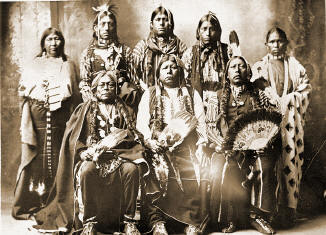|
|
The Tonkawa Nation
The name "Tonkawa is from the Waco term "tonkawea," meaning "staying together." The Tonkawa people call themselves "Titskan-Watich," meaning "indigenous men."

Tonkawas: (standing left to right) Winnie Richards, John Rush Buffalo, William Stevens, John Allen, Mary Richards; (seated left to right) John Williams,, Chief Grant Richards, Sherman Miles.
In historical accounts before the late 18th century, the Tonkawa as a whole are not discussed. Instead various "sub-tribes," each with its own designation, are listed. These include the Tonkawa proper, the Mayeye, the Yojucane and the Ervipiame. According to mission records, these four groups spoke the Tonkawa language. All four of these groups lived in western Texas and Oklahoma and into eastern New Mexico. By the end of the 18th century, the various Tonkawan groups began to be considered as a single Indian nation called the Tonkawa.
In their early history, the Tonkawa were nomadic, moving tipi villages according to the chief's lead. They were known among the Spanish and the later American traders for the large quantities of tallow, deerskins, buffalo robes and tongues they sold.
In 1542, the Tonkawa lived on the Trinity River in Texas. In 1719, the French and Spanish described them as one of the "roving nations" in the upper Red River region. In 1782, some of the Tonkawa were receiving stolen horses from the Lipan and other eastern Apache Nations, giving them in exchange firearms obtained from the French. But during the next decade, the Tonkawa became engaged in wars against the Lipan and stole horses from them.
In the 1820s, Tonkawa Indians were living along the middle and lower reaches of the Guadalupe, Colorado, and Brazos Rivers. It was during this period that the Tonkawa came to be friendly associates with the Lipan Apache. Hereafter, portions of these two nations were frequently living near, or with, one another.
By 1837, they had drifted toward the southwestern frontier of Texas and were among the Indian nations identified in Mexican territory. Treaties of peace with other tribes and one with the United States settled the Tonkawa on the Lower Reserve of the Brazos River in Texas.
In 1859, when the Texans drove out nearly all Indian nations from their state, the Tonkawa moved north to Indian Territory and settled along the Washita River under Wichita Agency supervision. During the Civil War, they fought for the South, and on October 24, 1862, their village was attacked by the Delaware and Shawnee, who were aided by bands of Wichita, Caddo and other Indian nations. Afterward, the remaining Tonkawa returned to Texas, where they eventually settled around Fort Griffin under governmental supervision.
In 1872, Tonkawa Indians were reported around Fort Griffin and in other parts of northern Texas; here some of them served as scouts, guides and spies for the American soldiers. By 1876, a few Lipan Apaches had settled with them at the Fort, and after 1878, the Lipan almost invariably are mentioned with the Tonkawa. These gradually came to be considered as a single unit.
The Tonkawa-Lipan group remained in the vicinity of Fort Griffin until October 1884, when most of them were removed to Indian Territory (present-day Oklahoma). These Indians were first placed on the Iowa reservation, but in June, 1885, they were permanently settled at the Oakland Agency on the west side of the Chikaskia River in north central Oklahoma.
In 1891, the Tonkawa and Lipan selected allotments of land, and the surplus lands were opened to homesteaders in the famous land run of 1893.
Today the Tonkawa Nation is located in north central Oklahoma, specifically in Kay County. The tribal headquarters is located at Fort Oakland, a Tonkawa Indian community just east of the town of Tonkawa. The Tonkawa Nation holds an annual pow wow every July near its tribal headquarters.
Please note: This information was compiled from several sources. Much of it came fromOklahomas Federally-Recognized Indian Tribes put out by the Oklahoma State Department of Education in 1992. The article entitled "The Tonkawas of Oklahoma," listed the following sources: Native American Resources in Oklahoma (pp. 131-132). Southwest Center for Human Relations Studies. Norman: University of Oklahoma, 1980.
Tonkawa Nation, P.O. Box 70, Tonkawa, OK 74653 580-628-2561
Fax 580-628-3375
www.members.tripod.com/tonkawa/nsmain.html
Texas Indians: Tonkawa - http://www.texasindians.com/tonk.htm
Brief overview of the Tonkawa, their culture and history, with a link to a book on the Tonkawa for sale. From the Texas Indians series. |
|
|
|
|
 Native American Nations
Native American Nations
